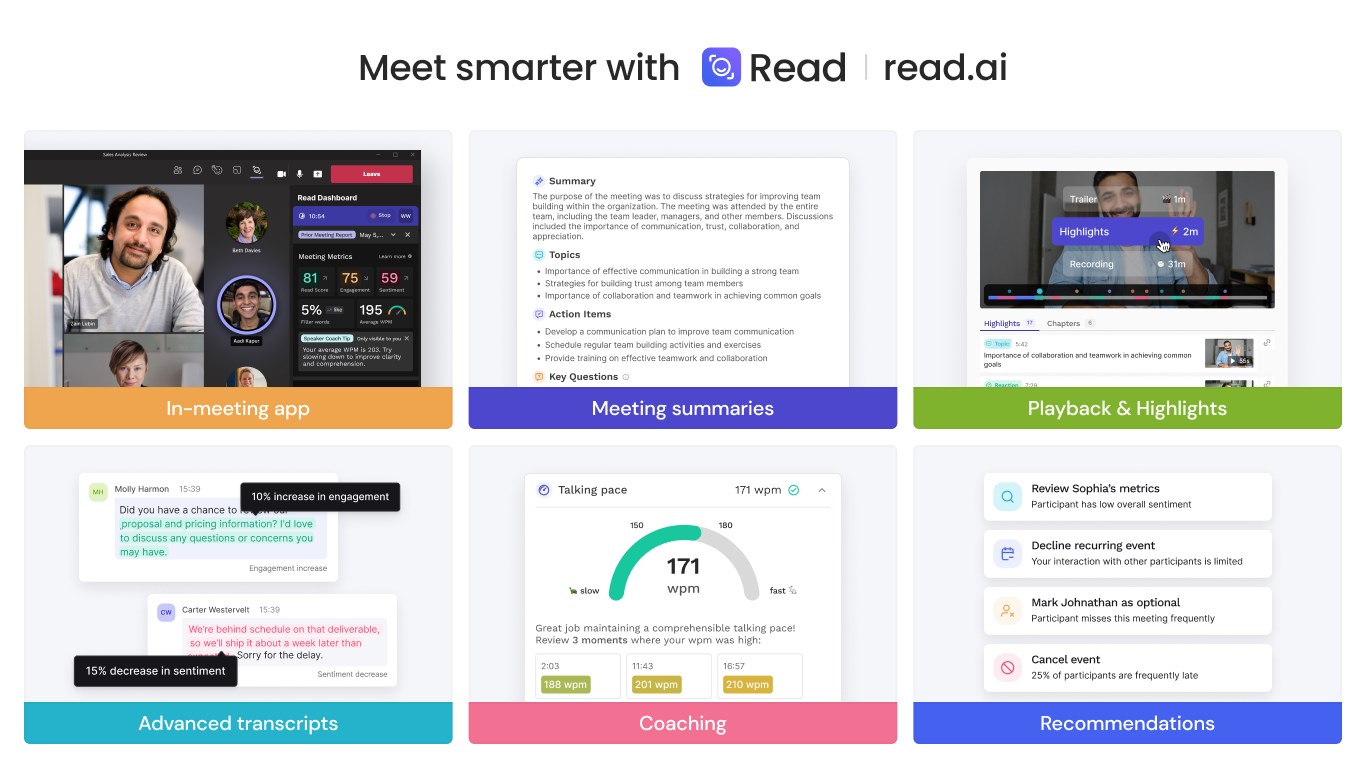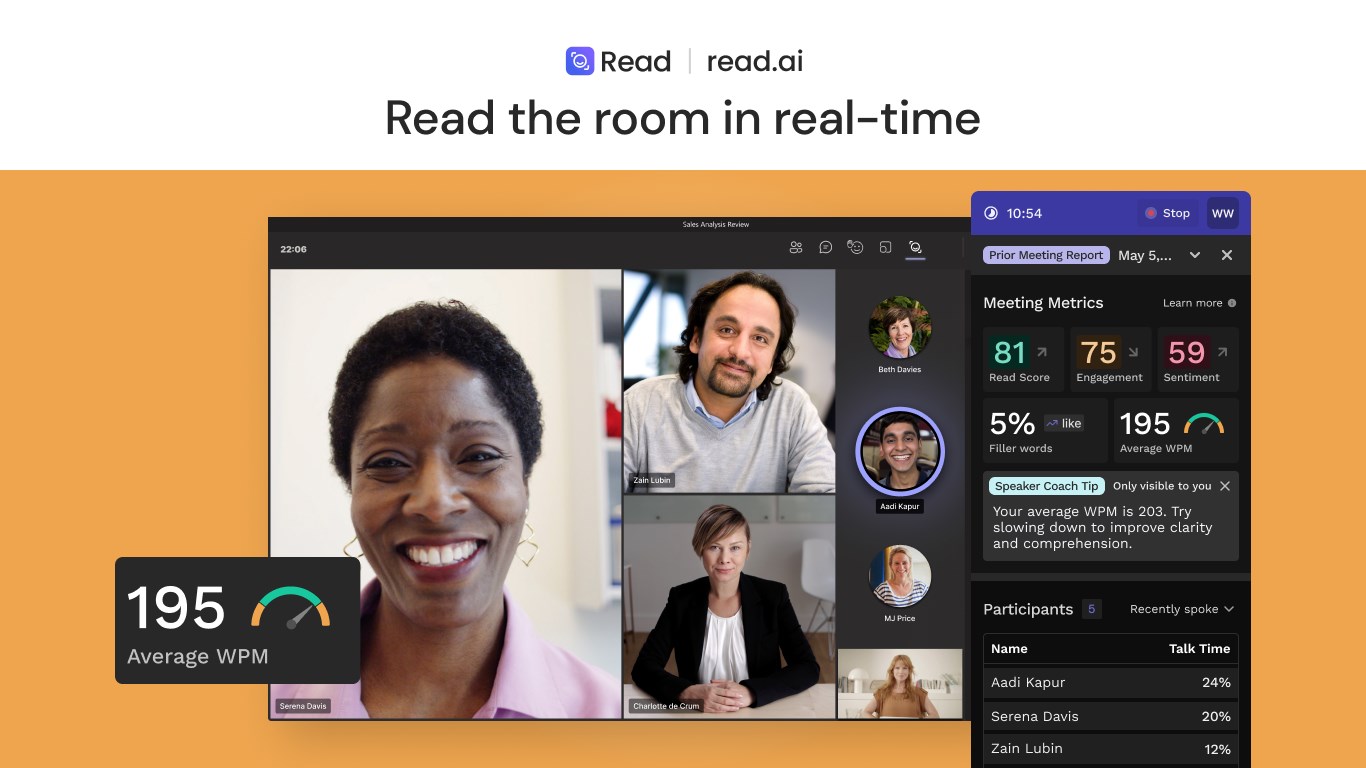Meetings are time-consuming, and there’s no way around it. According to a 2022 poll from Deputy.com, many U.S. workers spend up to around eight hours in meetings every week, depending on the industry and locale.
The productivity hit explains the growing popularity of AI-powered summarization tools. In a recent survey of marketers by The Conference Board, a nonprofit think tank, nearly half of respondents said they were using AI to summarize the content of emails, conference calls and more.
While a number of videoconferencing suites now offer built-in summarization features, David Shim believes that there’s room for third-party solutions. And he would: He’s the co-founder of Read AI, which summarizes video calls across platforms such as Zoom, Microsoft Teams and Google Meet.
Shim, previously the CEO of Foursquare, co-founded Read AI with Rob Williams and Elliott Waldron in 2021. Prior to Read AI, the trio worked together at Foursquare, Snapchat and Shim’s previous startup, Placed (which Foursquare acquired in 2019).
“Read AI’s direct competition is traditional project management, where notes are manually written,” Shim told TechCrunch. “By learning what’s important to you cross-platform, Read isn’t a co-pilot — rather, it’s an autopilot delivering content that makes your work more effective and efficient.”
At the start, Read focused exclusively on video meetings solutions, offering dashboards to measure how well a meeting’s going (as judged by certain metrics, at least) and two-minute summaries of hourlong meetings. But, coinciding with a recently closed $21 million funding round led by Goodwater Capital with Madrona Venture Group, the company is expanding into message and email summarization.
Available in “soft launch,” Read’s new capability connects to Gmail, Outlook and Slack as well as videoconferencing platforms to learn topics that might be relevant to you. Within 24 hours of connecting to the messaging and videoconferencing services you use, Read begins delivering daily updates with summaries, AI-generated “takeaways,” an overview of key content and updates to conversation topics in chronological order. Read charges a $15 to $30 monthly fee for its service.
“What makes Read unique is that its AI agents work quietly in the background, enabling your meetings, emails and messages to interact with each other,” Shim said, adding that the average summary from Read AI condenses 50 emails across 10 recipients into a single summary. “This connected intelligence unifies your communications and empowers you and your team with personalized, actionable briefings tailored to your needs and priorities.”
Now, color me skeptical, but I’m not sure I trust any AI-driven tool to summarize content consistently accurately.

Models like ChatGPT and Microsoft’s Copilot make mistakes when summarizing because of their tendency to hallucinate, including in summaries of meetings. In a recent piece, The Wall Street Journal cited an instance where, for one early adopter using Copilot for meetings, Copilot invented attendees and implied that calls were about subjects that were never actually discussed.
Is Read AI’s tool any different? Shim claims that it’s more robust than many of the solutions out there, including rivals like Supernormal and Otter.
“Read runs a proprietary methodology to coordinate raw content with language model outputs, so that deviations are automatically detected and appropriately steered,” he said. “Additionally, we can use content from meetings to better contextualize email and messaging content, further reducing uncertainty and improving results.”
Take that statement with a grain of salt. Shim didn’t share benchmark results to support those assertions.
In lieu of benchmarks, Shim emphasized the productivity boost summarization tools such as Read can (in theory) deliver.
“Rather than rescheduling a meeting as you’re running late or double-booked, Read can attend in your place and deliver to you a summary and action items that even the best executive assistant couldn’t match,” he said, stressing also that Read doesn’t use customer data to train its AI models and that users have “full control” over content passing through the platform. “AI is bringing focus back to knowledge workers [by] saving them hours a day.”
Read AI is no stranger to controversy, so it’s a little hard to take Shim at his word. The platform’s sentiment analysis tool, which interprets meeting participants’ vocal and facial cues to inform hosts on their sentiment, has been called out by privacy advocates for being overly invasive, prone to bias and very possibly a data security risk.
Gender and racial biases are a well–documented phenomenon in sentiment analysis algorithms.
Emotional analysis models tend to assign more negative emotions to Black people’s faces than white people’s, and perceive the language that some Black people use as aggressive or toxic. AI video hiring platforms have been found to respond differently to the same job candidate wearing different outfits, such as glasses and headscarves. And in a 2020 study from MIT, researchers showed that algorithms could become biased toward certain facial expressions, like smiling, which could reduce their accuracy.

Perhaps tellingly, Shim continues to see Read’s sentiment analysis technology as a competitive advantage, not a risk, while pointing out that customers can disable the feature and that analysis data is deleted from Read’s servers periodically. “Using a multimodal model allows Read to incorporate non-verbal responses into meeting summaries,” he said. “As an example, during a pitch meeting, a startup might talk about the benefits of the product, but the participants visually shake their heads and frown during the pitch … Read creates a custom baseline of engagement and sentiment for each meeting participant, rather than applying a one-size fits all model, ensuring that each person is treated as a unique person.”
Accurate or no, with a $32 million war chest and a customer base that grew by half a million users over the past quarter, Read clearly has some folks convinced that it can deliver on its promises.
Read, based in Seattle, Washington, plans to double its staff to over 40 employees by the end of the year leveraging the new infusion of capital, Shim said.
“In face of a broader slowdown over the last few years, Read has continued to see the growth curve steepen across users, meetings and revenue,” he added. “This acceleration in growth can directly be attributed to the quantifiable return users see in terms of time savings when using Read AI in their meetings.”































Comment